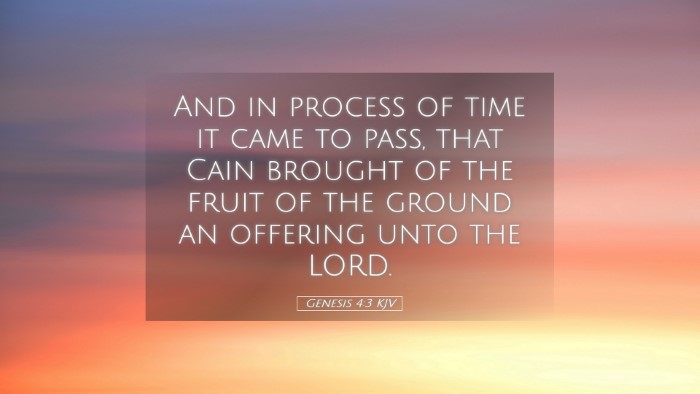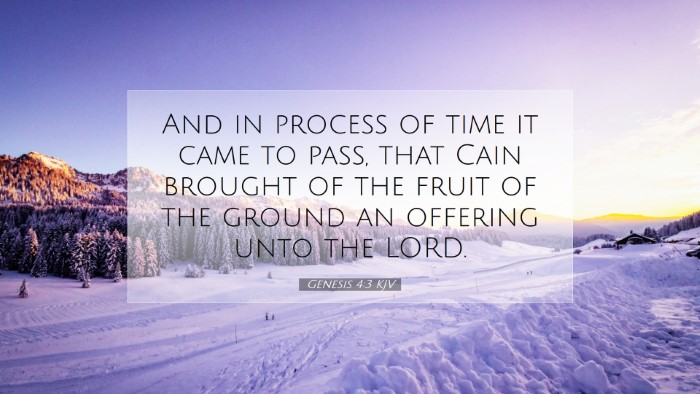Genesis 4:3 Commentary
Verse: "And in the process of time it came to pass, that Cain brought of the fruit of the ground an offering unto the Lord."
Introduction
Genesis 4:3 marks a significant moment in biblical history, illustrating the early relationship between humanity and God through the actions of Cain and Abel. This verse encapsulates themes of worship, sacrifice, and the human condition. The insights gleaned from public domain commentaries provide a richer understanding of the underlying principles and implications of this passage.
Contextual Framework
This verse occurs within the narrative of Cain and Abel, the first two sons of Adam and Eve. Understanding the broader context is crucial as it highlights the dynamics of familial relationships, sin, and divine acceptance of offerings. Matthew Henry emphasizes the importance of the 'process of time,' suggesting it denotes a specific occasion or designated time for worship, perhaps alluding to the integration of agriculture and sacrifice in worship practices.
Insights from Commentaries
-
Matthew Henry's Commentary:
Henry points out that Cain's offering, while coming from the fruit of the ground, does not imply divine rejection of agricultural produce as a form of offering. Instead, it reflects the attitude and intent behind the offering. Henry stresses the necessity of true worship wherein the heart must align with the act of sacrifice. The commentary delves into the notion that mere external adherence to rituals without sincere intent may not garner God’s favor.
-
Albert Barnes' Notes:
Barnes elaborates on the differences between Cain's and Abel's offerings, suggesting that Cain’s approach was devoid of the same spirit of faith that Abel exhibited. He notes that Abel offered a 'more excellent' sacrifice, one that acknowledged the need for blood atonement, thus setting a profound precedent for understanding salvation history. This commentary underscores the principle that God requires not only the act of giving but the attitude of the giver, highlighting faith as a critical component in acceptable worship.
-
Adam Clarke's Commentary:
Clarke addresses the significance of the term "the process of time," interpreting it as a reference to a culmination of seasons or a fixed period set by God. This implies that the act of offering was not arbitrary but rather a planned response to God's provisions and commands. Clarke often focuses on the moral lessons to be drawn, reminding scholars that God’s expectations transcend mere ritualistic practices and must engage the heart and mind.
Theological Implications
This verse raises critical theological questions regarding worship and its acceptability before God. The divergence between Cain’s offering and Abel’s reflects more than just a mere preference for one type of sacrifice over another; it sets the foundation for understanding God’s criteria for worship. This is echoed across the canonical texts of the Old and New Testaments, where God seeks a contrite heart over sacrifices (Psalm 51:17).
Sins of the Heart
Another significant aspect echoed in these commentaries is the recognition of Cain's inner turmoil and eventual sin. While the act of offering is central, the introspective nature of Cain’s heart is brought into focus. Henry suggests that Cain’s offerings lacked the earnestness that reflects true repentance and humility before God. This opens discussions about the consistency of one’s life with their worship and the authenticity of faith.
Application for Ministry
For pastors and theologians alike, this passage serves as an instructive lesson on the nature of worship and the condition of the heart in relation to divine acceptance. The call to analyze one's own offerings to God—whether through service, singing, or giving—remains pertinent. As scholars study this passage, they are reminded to guide congregations towards a faith that offers not just the outward forms of worship but a spirit attuned to the holiness and righteousness of God.
Conclusion
Genesis 4:3 provides a rich tapestry of insights into human worship, depicting the heart’s posture before God in acts of offerings. The reflections drawn from the commentaries illuminate God's desire for authenticity and faithfulness in worship, setting a standard that transcends the boundaries of time and culture. This commentary serves as a call to deeper spiritual introspection and a reminder of the ongoing relevance of Genesis in understanding our relationship with God.


